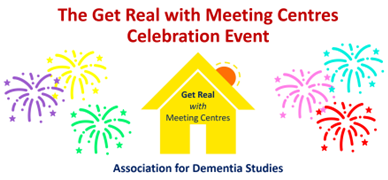It’s not like we sit around twiddling our thumbs at other times, but Dementia Action Week in May is looking particularly busy for us.
To start with, Age UK Herefordshire & Worcestershire and The Hive, Worcester are hosting a series of events and activities, and we’re part of three sessions.
On Monday 13th May Thomas Morton will be talking about ‘Doing Things with Dementia: Exploring Support to Keep People Connected’. Dementia research in the news is nearly always about finding a cure, but just as important is how we can support the nearly 1 million people (and growing) who are living with dementia right now. While a diagnosis of dementia is life changing, people can still live full and active lives with the condition – but support in the community needs to be better. Thomas will talk about the work we do to improve this situation, including initiatives like Meeting Centres that aim to connect people to their communities and each other. He will talk about what Meeting Centres are, who can go and what people do there, as well as the wider research that the Association for Dementia Studies does – and opportunities for people to get involved!
You can attend the session for free but need to book a place here.
On Tuesday 14th May Dr Chris Russell will be part of a ‘Behind the Cover’ session with his co-editors of the ‘Leisure and Everyday Life with Dementia’ book. The book examines leisure in the everyday lives of people living with dementia and challenges readers to consider the role of leisure activities beyond their potential for therapeutic benefit. Dr Russell leads the Postgraduate Certificate in Person-Centred Dementia Studies, is the Patient and Public Involvement Lead for the ‘Get Real with Meeting Centres’ research project, and a Dementia Knowledge Exchange Peer Reviewer with the World Health Organization. He also runs a popular ‘Championing Physical Activity for People Affected by Dementia‘ course.
Again, places for the session are free but must be booked.
Our final talk at The Hive is also on Tuesday 14th May and is looking at ‘Dementia and the physical environment: what improvements can we make?’ In this session, Teresa Atkinson will be looking at how dementia and the physical environment interact. You’ll learn about some of the symptoms of dementia and the impact these can have, before exploring how dementia friendly design can help. The session will cover the principles of dementia friendly environments, helping you to be more aware of your surroundings, before focusing on changes that can be made within the home and also within the garden. You’ll also have the opportunity to ask questions and get information about useful resources.
To book your free place use this link.
Our Meeting Centre family blanket will also be on display so if you haven’t seen it yet this could be a great opportunity.
If that wasn’t enough, we’re also part of the 2024 Pint of Science events in Worcester which takes place each evening from Monday 13th to Wednesday 15th May. Organised by the University of Worcester’s Doctoral School, the Pint of Science festival has academics providing talks on a wide variety of topics.
Thomas Morton will be presenting on 13th May as part of a session on ‘Doing Health Research Differently’. If you missed his talk earlier in the day at The Hive, this is a second chance as he will be covering many of the same talking points. Tickets for each Pint of Science session are £5 and can be booked via their website.
Still want more? Maybe you’re not based in Worcester and are feeling a bit left out? Well, you’re in luck. On 17th May (12 noon to 1pm), we will be hosting an online webinar that anyone can join! The webinar will be about ‘Past and Future of the Meeting Centre Support Programme in a contrasting economic context’ and we’re delighted that Sladana Pavkovic will be presenting. Sladana is from the University of Tasmania, and will delve into the Australian Meeting Centre Support Programme (MCSP), tracing its trajectory from pilot project to the establishment of two centres and subsequent challenges. She will discuss the evolving perspectives on revitalizing and adapting the MCSP model in a high-income Australian context, and the possibility to implement the program in a low-income setting such as Serbia.
Sladana is a third year PhD candidate in Dementia Studies at the Wicking Dementia Centre, University of Tasmania. Since 2020 and up to the present day, she has also taken the role of a part-time lecturer at the Wicking Centre. Since 2012 she has functioned as a “tele-care partner” and educator for her family residing in Serbia. Her primary aim has been to provide them with support and guidance in coping with her mother’s dementia. She has been involved in her care journey from the first onset of her symptoms, through the diagnostic process, active life with dementia, all the way to palliative care and her death in September 2023.
You can join the webinar using this link.
Phew! I think that’s more than enough for us to be getting on with, but who knows, we may find something extra to do that week!
Connect with ADS on twitter @DementiaStudies and on Facebook @adsuow
We’re also on Instagram, Threads and LinkedIn so have a look and find us there too.









